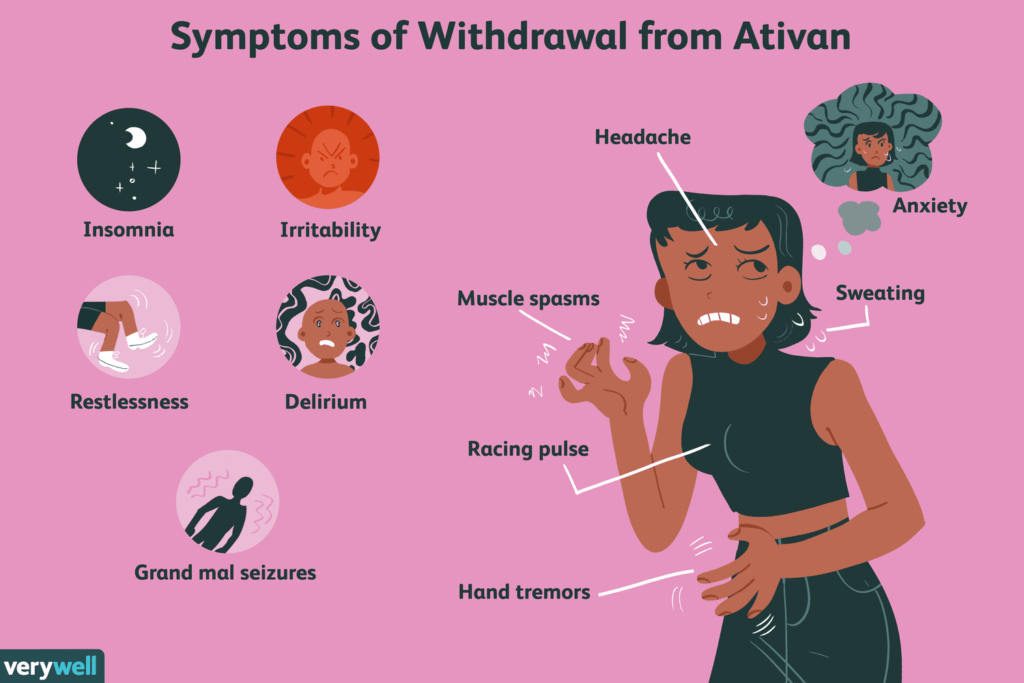Ativan (lorazepam) is a benzodiazepine commonly prescribed for anxiety, insomnia, and other conditions. While it can be effective, long-term use can lead to dependence, and withdrawal can be challenging. Ativan Withdrawal Symptoms safely requires careful planning and professional guidance to minimize discomfort and avoid potential complications.

Understanding Ativan Withdrawal
Ativan withdrawal occurs when the body, accustomed to the presence of the drug, reacts to its absence. Symptoms can range from mild to severe, depending on factors such as the dosage, duration of use, and individual health. Common withdrawal symptoms include anxiety, insomnia, irritability, sweating, headaches, and in severe cases, seizures and psychosis.
Benzodiazepine withdrawal, including Ativan, can be particularly challenging because of its potential to cause rebound symptoms—where the original symptoms return, often more intensely. This makes it crucial to approach withdrawal with a well-structured plan.
The Importance of Medical Supervision
Attempting to withdraw from Ativan without medical supervision is not advisable, especially after long-term use or high dosages. A healthcare professional can assess your situation, considering factors like your medical history, the dose of Ativan you’ve been taking, and how long you’ve been using it. Based on this, they can create a personalized tapering schedule, which involves gradually reducing the dose of Ativan over time.
This gradual reduction helps to minimize withdrawal symptoms and reduce the risk of severe complications. A typical tapering process may reduce the dosage by 10-25% every one to two weeks, though this varies depending on the individual.
Tapering Off Ativan: A Step-by-Step Approach
- Assessment and Planning: The first step in managing Ativan withdrawal is a thorough assessment by a healthcare provider. This includes evaluating your overall health, the reasons for using Ativan, and any underlying conditions that may need ongoing treatment.
- Creating a Tapering Schedule: A personalized tapering schedule is essential. The tapering process should be slow and steady to allow your body to adjust. The pace of tapering will depend on your initial dose and how your body responds to each reduction.
- Monitoring Symptoms: Regular follow-ups with your healthcare provider are crucial during the tapering process. This allows for adjustments to the tapering schedule if withdrawal symptoms become too intense. In some cases, adjunct medications may be prescribed to manage specific symptoms.
- Psychological Support: Withdrawal from Ativan can be as much a psychological challenge as a physical one. Cognitive-behavioral therapy (CBT), counseling, or support groups can provide essential emotional support during this period.
- Lifestyle Adjustments: Incorporating healthy lifestyle changes can support your withdrawal process. Regular exercise, a balanced diet, adequate hydration, and good sleep hygiene are all beneficial. Practices such as mindfulness, meditation, and yoga can also help manage anxiety and promote relaxation.
- Managing Rebound Symptoms: Rebound symptoms, such as heightened anxiety or insomnia, can occur as you reduce your Ativan dose. Having a plan in place to manage these symptoms is crucial. Non-benzodiazepine medications, herbal supplements like valerian root, and cognitive-behavioral strategies can be helpful in managing these symptoms.

Seeking Professional Help
If withdrawal symptoms become unmanageable or if you have been taking Ativan in high doses or for an extended period, inpatient or outpatient detox programs might be necessary. These programs provide a structured environment with 24-hour medical supervision, ensuring that withdrawal symptoms are managed safely and effectively.
Conclusion
Withdrawing from Ativan requires a careful and individualized approach to ensure safety and comfort. By working closely with a healthcare provider, following a gradual tapering plan, and incorporating supportive therapies, you can minimize withdrawal symptoms and reduce the risk of complications. Remember, you don’t have to go through this process alone—professional help and support are crucial to navigating Ativan withdrawal safely.